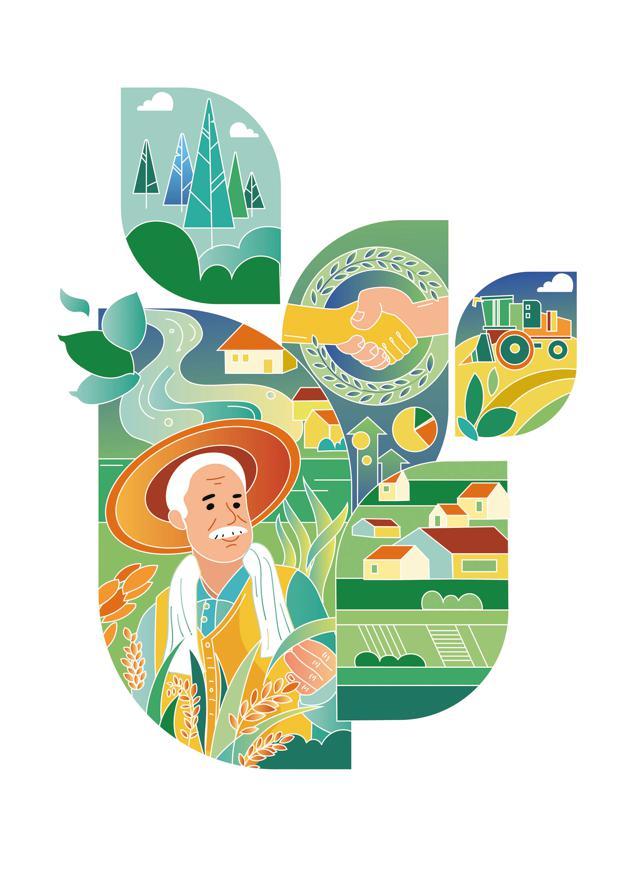
Last year in Sharm el-Sheikh, Egypt, the 27th session of the Conference of the Parties to the United Nations Framework Convention on Climate Change (COP27) opened the door to further unveil the untapped potential of smallholder farmers amid the challenges of climate change and food insecurity. The International Fund for Agricultural Development's commitment to expanding its investments to support smallholder farmers has gained increased urgency at COP28, which is being held in Dubai from Nov 30 to Dec 12.
Mitigating the impact of climate change is more urgent today than ever. There is a critical yet widening gap between the growing needs and the decreasing investment for climate financing in sustainable agriculture and resilient food systems. As outlined by IFAD, every dollar spent on climate resilience now can prevent up to $10 being required for emergency aid in the future — that is significant. While smallholder farmers are responsible for 35 percent of the world's food supply and being on the front lines of climate challenges, the funding allocated for them to bolster climate resilience remains remarkably inadequate. Shockingly, small-scale agrifood systems received $5.53 billion, only 0.8 percent of global climate finance in 2019-20, according to the Climate Policy Initiative.
This year's COP28 sounds an urgent alarm to global leaders, policymakers, private sector investors and development banks that investment in smallholder farmers must be prioritized to take advantage of the window of opportunity for increasing climate adaptation. The truth is that our inaction today will lead to severe economic and social repercussions in the future. This will leave smallholder farmers — who have contributed the most with the fewest resources — unprepared in the midst of the climate crisis. This will lead to reduced food production, increased food prices, exacerbation of hunger and poverty, and ultimately failure to achieve sustainable development goals.
China is responding to the clarion call to nations to do their bit. In 2020, Chinese President Xi Jinping announced China's ambition to achieve carbon neutrality before 2060 at the United Nations General Assembly. Studies estimate that improvements in agricultural technologies combined with shifts in dietary patterns could slash emissions from agrifood systems by nearly 50 percent by 2060 in China. But this goal will only be accomplished by engaging and empowering smallholder farmers, who constitute 90 percent of the agricultural workforce and cultivate over 70 percent of the arable land in the country, according to China's third agricultural census conducted in 2020.
The focus on the smallholder and a resilient and sustainable agrifood system are at the center of IFAD's operations in China. We are actively integrating climate change adaptation to promote sustainable agriculture in China. For instance, in Qinba, Shaanxi province, a region that is highly vulnerable to climate change, the Sustaining Poverty Reduction through Agribusiness Development in South Shaanxi Project is offering essential technical guidance to local policymakers, companies and smallholder farmers to navigate various natural disasters, particularly droughts, to expand insurance coverage to safeguard smallholder farmers' livelihoods and promote digital technologies for farm oversight and crop monitoring. In the same province, IFAD has scaled up digital tracking systems and provided farmers with sustainable ways of rearing pigs with less environmental impact.
IFAD China is also empowering rural women and youths, crucial actors in building climate resilience within small-scale agrifood systems, by providing them with necessary skills and resources. Through projects such as the Hunan Rural Revitalization Demonstration, upskilled rural women are engaged in sustainable agricultural practices. In the Guangxi Zhuang autonomous region, IFAD's initiatives have helped predominantly female farmers install biogas converters for electricity, thereby reducing deforestation and their annual workload by 60 days.
Knowledge continues to be central and its exchange, together with the plethora of experience gathered through South-South cooperation, can harness the most resilient agricultural practices for climate adaptation. Such collaborations are currently facilitated between China and other developing nations via platforms supported by IFAD China. For instance, we have facilitated knowledge exchange dialogue between China and Pakistan to address climate change adaptation and mitigation, focusing on tackling Pakistan's deforestation, desertification and water management.
At a time of rising food insecurity, the decision-makers at COP28 are urged to rethink the climate agenda. Developed nations, international financial institutions, private sector investors and other stakeholders should collaborate and address the unmet financing needs of smallholder farmers. It's now or never for us to safeguard smallholder farmers, who sustain the current generation and generations to come.